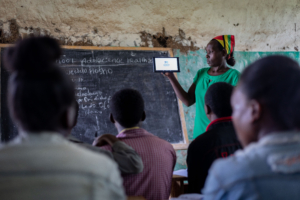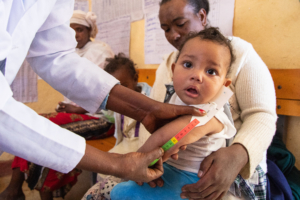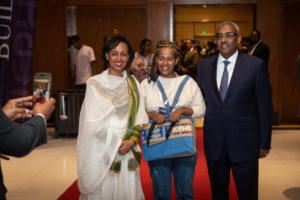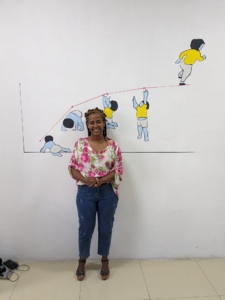Serkalem Getachew has spent 13 years working toward a singular goal. “I became a community health worker because I wanted to help women and their children,” she says. “I will be satisfied when I see them satisfied.”
Serkalem delivers care to patients in Legambo District in Ethiopia’s Amhara Region. She is part of the country’s flagship Health Extension Program, which has trained and deployed more than 40,000 female community health workers—known nationally as health extension workers—to provide an essential package of primary health services in rural and remote communities.
“First of all I work on prevention, and when someone is sick or needs care I work on the service that has to be given,” she says. This includes a full range of primary care skills, from malnutrition screenings to treatment of childhood diseases. “Even after that I provide all the referrals to the hospital for patients who need more care,” Serkalem adds. “I provide family planning services, maternal and child services, and assist with other health needs. I am especially happy when I’m working on maternal and child health.”
Some days, she works from Chiro Health Post, and others, she conducts house-to-house visits. “During the visits, I show the promotion of health and wellness, supporting people in their daily routines,” Serkalem explains. “I try to be as close as I can as much as possible to build a strong relationship with my community to help give them support in keeping a healthy home and family.”
Serkalem faces risks in her work. “We travel long distances for home visits and we face threats of gender-based violence,” she says frankly. “We are not accepted by men when we discuss family planning.”
But despite the challenges, Serkalem perseveres. In remote areas like the ones she serves, patients rely on help within their own communities more than ever—an urgent example of why investing in community health workers and the systems that support them is key to saving lives at the last mile. For Ethiopia’s hard-to-reach communities, support comes in the form of resilient and durably funded community health systems, strong training, reliable supplies, and integration into systems that ensure their needs are addressed and the community health data they gather reaches district and national health leaders.

Community health workers in Ethiopia receive training on reproductive, maternal, neonatal, and child health.
For Serkalem, quality training has prepared her to provide preventive care, treatment, and referrals within the community. She loves to learn: in addition to her training in community health, she holds a degree in management, and she’s passionate about sharpening her existing skills and gaining new ones. In summer 2023, she completed a new blended learning training developed by Last Mile Health and the Ministry of Health. The module—which focuses on maternal and child health—includes both digital and in-person elements. “It’s not even comparable to the other trainings I’ve received,” Serkalem shares. “This one was more interactive, more interesting. The app is quite simple to use—it’s friendly. Regarding knowledge and skills gain, it’s very helpful. You can watch the videos again and again and perfect it—you can see all the steps and procedures.”
In addition to referring to the app to refresh her skills, Serkalem also uses it to help educate her community. “I used to use different printed materials like posters and brochures before to help with patients, but now it’s all in the tablet so I can share all the information on community health in one place,” she says.
Digital systems, says Serkalem, have been vital in ensuring she can provide uninterrupted care to her patients, maintaining their records and delivering the services they need even during the conflict. “Previously if we lost the materials it was difficult to get them back, but now we can easily find the data we need,” she explains. “For example, my tablet was destroyed during the course of my work, but because everything had been uploaded to the server, the data wasn’t lost at all.”

A community health worker measures an infant’s mid-upper arm circumference to screen for malnutrition.
She remains driven to improve health outcomes for mothers and children in her community—including her own two children. She has received awards for several achievements in her community: eliminating home deliveries, achieving zero maternal deaths, and enhancing mother and child feeding practices. But the most rewarding aspect of her work, she says, is seeing her patients healthy and happy.
One story stands out for her. “There was a woman pregnant with triplets. She was able to deliver only the first one, and her family brought her to the health post,” she remembers. Her maternal and child health training—which includes clean delivery, newborn care, and the promotion of delivery at health facilities rather than at home—prepared her to help the mother, who safely delivered the second and third babies. “Today the triplets are eight years old, and they are all healthy,” Serkalem says.

Serkalem Getachew meets Ethiopia’s Minister of Health, Dr. Lia Tadesse and the Deputy Prime Minister of Ethiopia, Demeke Mekonnen, at the International Conference on Primary Health Care in Addis Ababa, Ethiopia.
Experiences like these compel her to continue her work despite the difficulties. She urges stakeholders to pay attention to the needs of community health workers—from fair pay and safe working conditions to adequate supplies. Her patients’ wellbeing depends on her ability to provide timely, high-quality care. “Community health workers are the most responsible for the health of our communities because all patients start with us,” she says.
For Serkalem, everything she does connects back to her mothers and children. “Mothers and children suffer the most, so it’s important to give attention to maternal and child health. My message is that we must prioritize this,” she says.
Community health workers, she believes, are the key to change, one patient at a time. “We are the linkage to the health system for all patients in our communities,” says Serkalem. “I am the most responsible in preventing maternal and child death in my community.”





